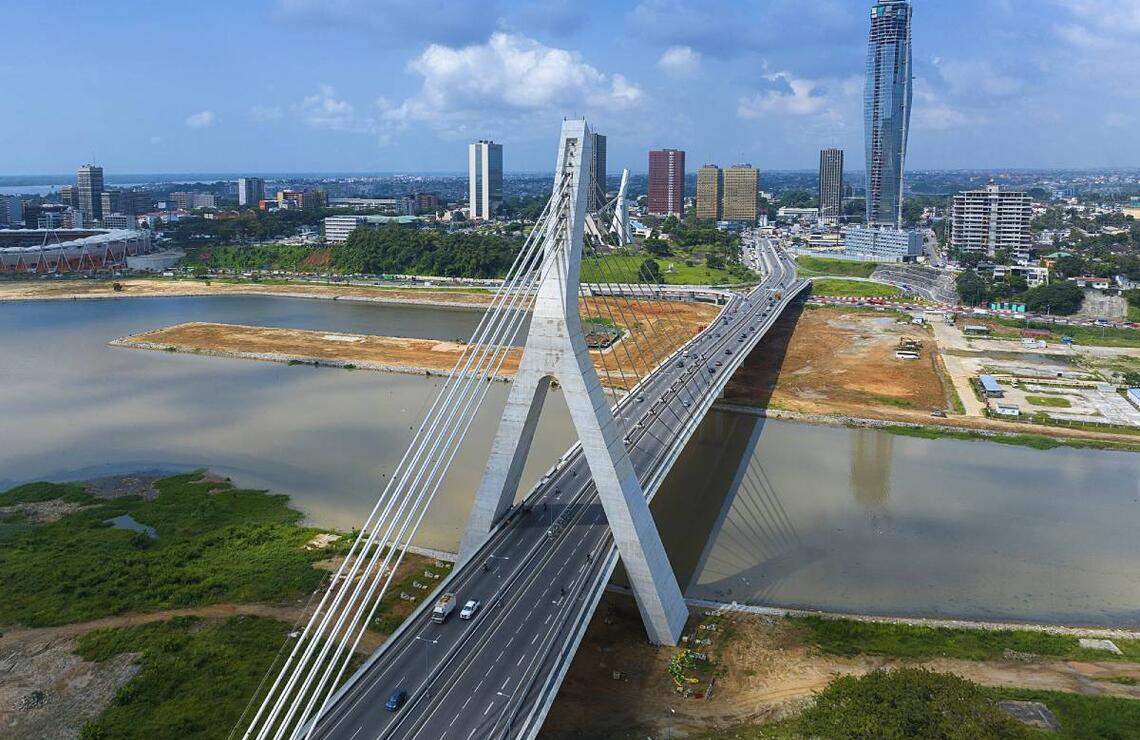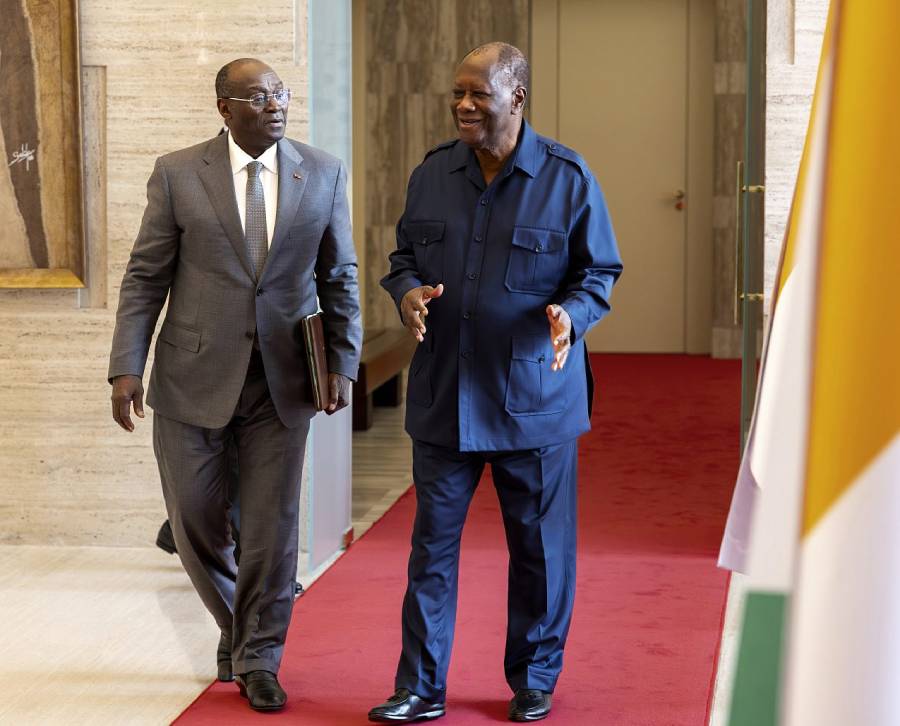
Epochal changes
Côte d'Ivoire has been undergoing a profound transformation since 2011. It's progress as an emerging country is steady and sure, and the presidential election in October will be a major milestone.
All of this almost seems ‘normal’ today. A country of nearly 30 million inhabitants, between the Sahel and the sea, a country at peace despite an extremely unstable regional environment, a nation largely reconciled with itself, with multiple identities, the product of an astonishing mix of cultures. Since 2011, Côte d'Ivoire's progress as an emerging country has been rapid. With a booming economy and one of the most sustained growth rates in the world (7% on average over the last ten years), even during the tough Covid crisis (with a very slight increase in 2020). It is the ninth largest economy on the continent. Abidjan, a large metropolis, is undergoing constant development and is determined to transform itself into a gateway to the continent and an interface with the world. There is also energy, in the literal sense, with very few power cuts and electricity available in almost every corner of the country. Since 2011, the country has undergone a physical transformation. With infrastructure, roads and bridges. Enabling people to move around, travel and trade in peace. But also schools, colleges, health centres, teaching hospitals... Since 2011, five universities have been opened, decentralising knowledge and contributing to the creation of regional hubs.
Côte d'Ivoire continues to be the world's leading cocoa producer and an agricultural powerhouse, and is now venturing into oil and gas production. The tertiary sector (51% of GDP), which includes services, is growing, signalling further modernisation. The hospitality business is booming, with hotels, restaurants, Airbnb, rentals and transport development, including the national airline, Air Côte d'Ivoire, which is set to open new routes to Europe. Ultimately, Côte d'Ivoire's signature is ‘worth its weight in gold’. Côte d'Ivoire is credible. Just recently, it raised nearly $1.75 billion on the markets at a very competitive rate of 6.45%, maturing in 2036...
However, this is not just about economic development. Côte d'Ivoire is also emerging in terms of soft power and cultural exports. With globally oriented music such as zouglou and coupé-décalé, the country is evolving towards the new urban sounds of Ivorian rap. There is also the emergence of a real contemporary art ecosystem, with galleries and talented creators such as Aboudia, Ouattara Watts, Jean Servais Somian, Joana Choumali and Laetitia Ky, among others. Sport is also thriving, with the success of the 2024 African Cup of Nations and the amazing success of the Elephants, as well as the team's performance at the last Olympic Games. Flights to the country are filled with tourists, visitors, investors and adventurers, all contributing in their own way to this amazing ‘Ivorian way of life’.
PROGRESSIVE RECONCILIATION

All this may seem obvious. However, it bears repeating, especially for younger people and visitors today, that we have come a long way. In 2011, when Alassane Dramane Ouattara (ADO) was elected, Côte d'Ivoire emerged from a long cycle of crises, which began with the death of its founder Félix Houphouët-Boigny (December 1993) and the promotion of the poisonous concept of ‘ivoirité’. The mirror shattered in December 1999. President Henri Konan Bédié was overthrown in a coup d'état (on Christmas Day). Laurent Gbagbo came to power in October 2000. In September 2002, following a rebellion, the country was split in two. The crisis reached its peak during the November 2010 presidential election which, since 2005, had been postponed several times. Laurent Gbagbo refused to recognise Alassane Ouattara's victory. This was the historic episode of the Golf Hotel, and the fall of the ‘baker’ (Gbagbo had refused to leave the presidential palace or to lift the blockade of the Golf Hotel, the temporary HQ of newly elected President Ouattara). It marked the beginning of the ADO era. The country was exhausted, with virtually no water or electricity. And yet, in two or three years, it was back on its feet, with people gradually coming together, working and living side by side. It was a gradual reconciliation, achieved largely without coercion or violence. This was quickly followed by rapid growth, investment in infrastructure and overall progress.
Nothing is simple, of course. The Ivorian model is still under construction, subject to intense catch-up pressures and ever-present external shocks. Despite rapid progress, Côte d'Ivoire is still classified as a lower middle-income country. The goal is to move up to the next level by 2030. Poverty still affects 37% of the population, although, for the first time since the 1980s, it is on a downward trend. Growth is transforming society, leading to the emergence of a new middle class. However, there are significant inequalities and geographical disparities. The Human Development Index (HDI) remains below the country's overall performance. Abidjan (which accounts for nearly 80% of Côte d'Ivoire's GDP), often feels like another country. Despite government programmes, inclusivity remains a political and societal priority. Demographics and immigration, exacerbated by regional destabilisation, bring their own set of constraints in terms of social investment. The capital needed to maintain momentum is considerable, with constant pressure to deliver results. Nearly 600 billion CFA francs, between the private and public sectors, have been earmarked in the 2021-2025 National Development Plan. Security weighs heavily on the balance sheet, particularly on the country's northern borders. Lastly, the effects of climate change could disrupt future patterns of growth, food sovereignty and cocoa cultivation. The challenges are clear. There is a need to move faster on clean industrialisation, sustainable development, job creation and adaptation to new technologies and the world to come. Faster progress is needed in terms of growth, diversification, modernisation of the state, development of the private sector, education and training. More wealth is needed to enable better distribution, lift all Ivorians out of poverty and put the country firmly on the path to sustainable emergence.
ADO'S LEGACY
However, these ‘musts’ do not change today's reality. There are still too few places in Africa where people believe in the future with relative optimism, where there is a sense of dynamism, ambition and ‘weight’. In Côte d'Ivoire, a country young in terms of its history and population (75% of inhabitants are under the age of 35), there is a contradictory dual legacy: that of division, which is receding, and that of great national ambition, which is growing stronger. Despite cultural and regional differences that may resurface, there is a growing sense of national community, a desire to avoid divisions and to look firmly to the future.
At the centre of the equation is President Alassane Dramane Ouattara, in power since 2011. He is the architect of this Ivorian revival. It is he who governs and arbitrates. This is his project, and the project of a lifetime. He has a strategy, a method and a team that remains disciplined despite the legitimate ambitions of its members. He is driven by a constant desire to make his mark, to have ‘achieved’ something, to have implemented a genuine African model for emergence, and to have delivered results. The president is mindful of his legacy. And today, almost fifteen years after the November 2010 election, the results are there for all to see, which is rare. Over the past fifteen years, there are not many African countries that can claim to have experienced such a positive trajectory, far from it. As the prestigious British magazine The Economist recently pointed out: ‘It is Africa's best-kept secret.’
Now, all eyes are on the next presidential election, scheduled for October. It will be the twelfth in the country's history, the sixth since 1990 and the advent of multiparty politics. The president has served three terms, with a new constitution in 2016 and amendments in 2020. This is a crucial moment for ADO. In the coming weeks, he will have to decide whether to run for a fourth term or to back another candidate. Of all the possible scenarios, a ‘quiet exit’ is the least likely. Whether he runs or not, he will be a central player in the sequence of events; history will not be written without him. The president feels responsible as the guarantor of peace and stability and of the ambition for economic emergence. He also feels he is on the front line, duty-bound to protect Côte d'Ivoire from dangers and threats. But he also knows that he has to set the wheels in motion, open a new cycle, renew his party's offer and rally the troops with a programme that goes beyond the concept of continuity. And already, for a large part of the political class, the next deadline, that of 2030, is looming.
EMULATION IN THE CIRCLES OF POWER
The presidential election in October 2025 is therefore far from a formality. There will be debate, there will be competition, there will be clashes of personalities and, inevitably, a shift towards generational transition. The opposition is far from voiceless. Leading figures are emerging who will spearhead the charge... All under the watchful eye of the major powers and the country's long-standing partners.
The debate remains difficult and complex, marked by recent history. But progress is real, with legislation, courts and institutional processes in place. The most recent parliamentary elections (March 2021) and municipal elections (September 2023) were open and transparent, with genuine competition, sometimes fierce, and a mature electoral dispute resolution process. The president is the president, that much is clear. But the system has multiple entry points. There is competition and emulation in the spheres of power. And above all, there is a media-savvy society, an active civil society, political figures, intellectuals and opponents who speak out despite the ‘difficulties’ inherent in their status.
ECONOMIC, POLITICAL AND SOCIAL EMERGENCE
This will therefore be a test of political maturity, especially for the main players. A moment of truth for the democratic consolidation process. Public opinion and society, across all ideological divides, from shopkeepers to students, taxi drivers to big business leaders, are saying loud and clear: let's have a real process, a real debate, and above all, let's do it calmly and without violence.
What is at stake goes far beyond personal destinies and ambitions. Côte d'Ivoire is emerging economically, politically and socially. It is a rare, ambitious, bold and fragile national edifice. Growth and progress are not irreversible achievements. As has been said, 75% of the population is under 35. And tomorrow, by 2050, there will be more than 50 million citizens. The challenges are there, and we must face them collectively. More than ever, we must demonstrate dialogue, modernity and responsibility. That, too, is what 'emergence' is all about.